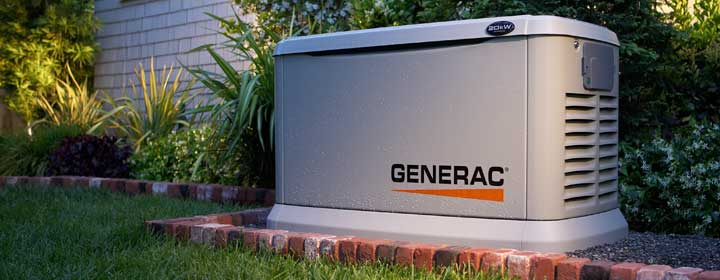 Storms, heavy snows, winds, and accidents can cause a power outage; but that doesn't mean you're stranded in the dark until electricity is restored. A home backup generator can supply enough power to keep at least the necessities in working order until repairs are made in your area.
Storms, heavy snows, winds, and accidents can cause a power outage; but that doesn't mean you're stranded in the dark until electricity is restored. A home backup generator can supply enough power to keep at least the necessities in working order until repairs are made in your area. Preparing for a Backup Generator
The last thing you want is to buy a generator when you need it. It's much better to plan early and get the right one for the job. There's more to it than buying the biggest one available, though. You'll need to put a lot of thought into this purchase, and make some decisions about what's most important to you and your family.
Set your priorities well in advance
Most homeowners don't intend to supply power to the whole house using a generator when the electricity goes out. There are things you'll definitely need, such as your refrigerator, and things you can probably go without, such as televisions throughout the house or unnecessary lighting.
When you set your priorities in advance, you can buy a generator that's suited to your genuine needs rather than what you think you might want. Choosing on the fly can lead to buying a generator that's too small or too large, so the best time to make those decisions is now.
Don't skip the transfer switch
If you use a generator, you must have a transfer switch. A transfer switch takes your house "off grid" when the power is out, and allows you to use the power produced by a generator. When main power is restored, the switch disconnects your home from the generator and routes it back to the grid.
Without a transfer switch, the electricity produced by your generator could backfeed, or send electricity from your home to the transformer in your area. If workers are performing repairs at the transformer, the electricity from your generator could cause injury to the workers, or much worse.
Select the right generator for your load
Once you know which electrical devices and appliances you want to run during a power outage, you're ready to select a generator to do the job. You'll need to know the running watts and also the starting watts for each item. Starting watts are higher than running watts for electrical items that have a motor, such as your HVAC unit.
If you're not sure about the watts for an electrical device, you can calculate it to get reasonably close. The volts multiplied by the amps equal the watts. This information should be on the device labeling. For example, you can find the volts, amps, and likely the watts for most televisions on the back panel. On a clothes dryer, that information is usually on a plate mounted inside the door. Download our handy-dandy Wattage Worksheet to help you with this step.
When you set your priorities in advance, you can buy a generator that's suited to your genuine needs rather than what you think you might want. Choosing on the fly can lead to buying a generator that's too small or too large, so the best time to make those decisions is now.
Don't skip the transfer switch
If you use a generator, you must have a transfer switch. A transfer switch takes your house "off grid" when the power is out, and allows you to use the power produced by a generator. When main power is restored, the switch disconnects your home from the generator and routes it back to the grid.
Without a transfer switch, the electricity produced by your generator could backfeed, or send electricity from your home to the transformer in your area. If workers are performing repairs at the transformer, the electricity from your generator could cause injury to the workers, or much worse.
Select the right generator for your load
Once you know which electrical devices and appliances you want to run during a power outage, you're ready to select a generator to do the job. You'll need to know the running watts and also the starting watts for each item. Starting watts are higher than running watts for electrical items that have a motor, such as your HVAC unit.
If you're not sure about the watts for an electrical device, you can calculate it to get reasonably close. The volts multiplied by the amps equal the watts. This information should be on the device labeling. For example, you can find the volts, amps, and likely the watts for most televisions on the back panel. On a clothes dryer, that information is usually on a plate mounted inside the door. Download our handy-dandy Wattage Worksheet to help you with this step.
You won't need a generator every day, every week, or even every month. But when you do, you'll be glad you prepared ahead of time. Instead of rushing to a big box store to buy whichever model is left in stock, you'll have exactly the one you need. More important, it will be installed and ready to go when you need it.
ECI can help you choose the right generator to supply power to your home when the rest of the neighborhood goes dark. Click the button below to schedule a free estimate or simply call 215-245-3200.
ECI can help you choose the right generator to supply power to your home when the rest of the neighborhood goes dark. Click the button below to schedule a free estimate or simply call 215-245-3200.




